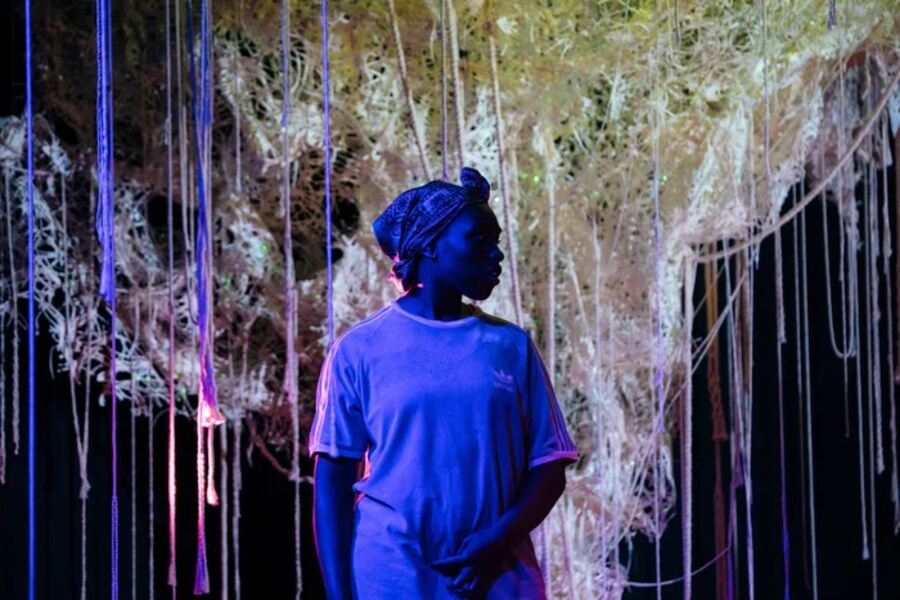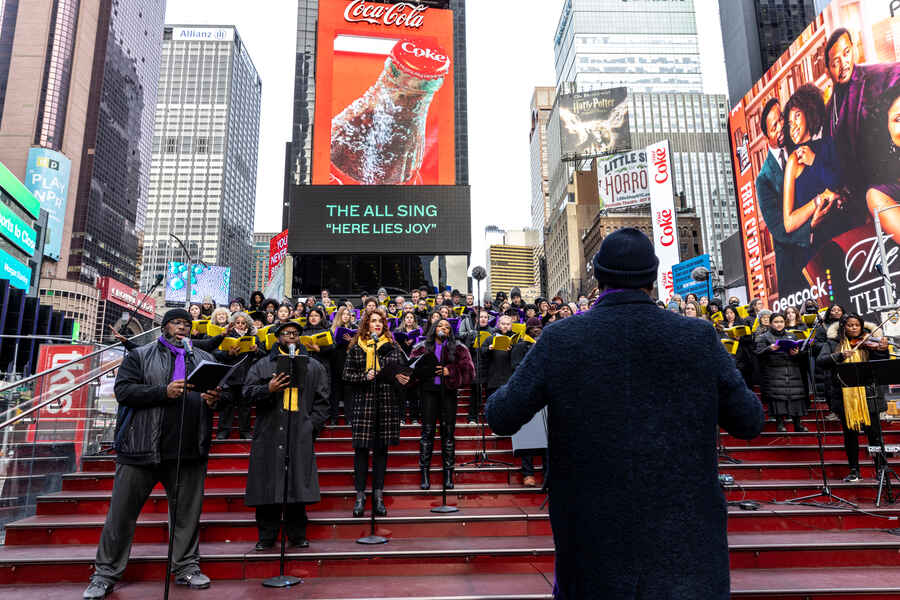After years of pandemic interruptions that led to postponements, cancellations, or exclusively virtual offerings, New York’s experimental January came roaring back: Under the Radar, Prototype, and Exponential festivals returned in full force, and in person.
As with any prior year, you never know what you might see (and not see). Hearing someone talk about a revelatory night of theatre they experienced at a show you didn’t put on your schedule just underlines the challenge of navigating the month’s many festivals. But unlike in past years, what it means to gather in person has shifted. At Under the Radar’s The Indigo Room, a carnival barker blared about us all breathing the same air as if it were some sort of unifying act. Squished together into the La MaMa lobby, thankfully masked, I was glad that was not literally true.
Still, with shows about ritual, memory, migration, obsession (sexual and otherwise), queer legacy, the pandemic, and climate change, there was no lack of big ideas across the festivals, and thankfully we, at long last, got to have more moments to watch and reflect on them together. (UTR and Prototype have ended, while Exponential continues through Feb. 8.)
Ritual, Meditation, and Remembrance
Starting out as an impressionistic meditation on colonialism, Kaneza Schaal’s KLII (at UTR) had her portraying King Leopold II of Belgium, who “founded” a private empire by annexing the Congo as his own. Schall conjured him through a pasted-on gray beard and 19th-century military epaulets over a heaping skirt made of layers of fabric swatches. An imposing figure, she looked dismissive on a throne, then ascended a staircase to perform speeches (hard to hear and a little difficult to follow).
The show’s striking movement and production design proved more effective than the text. We understood the symbolism of this figure whose destructive legacy remains etched into the Congo, perhaps even in the “traditional” tiny chocolate hands still sold in Belgium today. (Some argue they are meant to be a symbol of the Congolese hands cut off under Leopold’s reign of terror; Belgians believe the hands reference an old folk tale.)
Schaal then switched gears entirely. Dropping the beard and Leopold pretense, she spoke in her own voice of her grandfather’s journey from Rwanda to his founding a welcoming guest house in Burundi which stands to this day. Rather than leave us with the horrors of Leopold or the Rwandan genocide which later followed her family’s exile, Schaal erected this theatre piece as a monument to men like her grandfather who embraced and loved his neighbors—reminding us of the communities that colonialism tried to but could not entirely dismantle.
In a quiet meditation of the more incense-fueled kind, Evan Silver, in their piece cryptochrome at the Exponential Festival, performed as Tiresias, looking to the world of mythology, animals, and nature to talk about migration, change, and the harm humans have wrought.
A cryptochrome is a light-sensitive protein that scientists believe helps birds sense magnetic fields and guide their navigation. Tiresias asked us to imagine what it might be like to have this kind of innate knowledge imprinted on us—the sense of being a hawk, a dragonfly, a star-nosed mole, or a human academic with macular degeneration who wishes they could be a bird.
Silver-as-Tiresias, their face painted white, with a splash of black over one eye and feather-like extended fingers, whisper-narrated and sang with a cabaret feel, while Mizuho Kappa danced out animal experiences: fluttering, flapping, crawling.
Here the text, with the vibe of a radio drama, was the dominant element, and it had a mystical bedtime lullaby quality. In fact, audience members could lie down on actual beds and keep our eyes closed if we preferred. But perhaps because of the show’s imaginative premise, I longed for a more intimate setting to make it easier to give over completely to Tiresias’s voice.

Sex and Obsession
Irish composer Emma O’Halloran presented Trade, a tense, aching chamber opera, at Prototype. It was made in collaboration with Mark O’Halloran, her uncle, who wrote the libretto and adapted his play of the same title.
In Trade we meet two men in a hotel room. Sex is in the air as they talk of wives and girlfriends and connect to each other as fellow fathers and fuck-ups. While the older man feels drawn to pay for sex with this young man, there is something in his desire that went deeper than the erotic—an attraction to youth itself, what he calls “a shiny thing.” Or maybe this young man might serve as a soft place to land as the older man’s life crumbles.
With a landscape of music that reflects the characters’ anxiety, melancholy, and longing, the libretto offers an array of character tensions that the music teases out further. Fantasy, masculinity, self-perception, and self-knowledge all get an airing. These characters are not easily categorized, and their slipperiness gives the opera an appealing dramatic hook.
Looking at sex from another angle, Rachel Mars presented a monologue of historic lusty letters juxtaposed with contemporary sexts called Your Sexts Are Shit: Older Better Letters (at UTR). Mars read out everything from James Joyce’s enthusiastic ode to his partner’s “girlish” farts to Frida Kahlo speaking of sex through nature and fruit metaphors.
Perhaps the most poignant was Brother Augustine’s love letter to another monk in 1864, which instructed its object to burn the letter so no one would ever know. Instead the letter was intercepted and published in a newspaper, which sent Augustine into hiding forever.
The show reminded me of something a friend said once in a wedding toast: You can never know the inner workings of someone else’s relationship. As Mars pointed out, even having access to Gertrude Stein’s love letters, we are left to wonder whether her secret code word “cow” meant shit or orgasms. And how were these letters received? Was it a turn-on to be called a “red hot shrew” by Charles Bukowski? (Or did I mishear—was it in fact a “red hot screw”? And is that better or worse?)
Mars shared her own relationship correspondence, leaning into the idea of sending forth a creation of yourself in words, then envisioning the person receiving it. We were left then to fill in the gaps of these historic love lives and use our imaginations. After all, isn’t that where so much of our erotic selves lives—in our mind?

The Language of Now
Some shows foregrounded language in unexpected ways. For seven methods of killing kylie jenner (UTR), playwright Jasmine Lee-Jones and director Milli Bhatia portrayed, through impressive actor physicality, internet virality before our eyes.
Cleo (Leanne Henlon), outraged by an article saying Kylie Jenner was a “self-made billionaire,” stirs up an internet hornet’s nest by tweeting out suggestions on how Jenner should die (hashtag death by poison). Her best friend Kara (Tia Bannon) comes over to convince her to delete the tweets. The play probes Jenner’s image, built on cultural appropriation of Blackness, while Black women are made to feel “less than” for the same things Jenner is seen as being celebrated for.
Lee-Jones centers our online universe as it snarls and escalates into doxxing toxicity. This then spills over into the friendship as these two besties rehash past wrongs they committed against each other, with some scorched-earth internet vitriol lobbed at each other face to face. The talented Bannon and Henlon exploded at times into accents and gestures in quick succession to represent the rapid-fire “discourse” of a social media timeline pulsing through them.
Though the show employs Black British slang and internet speak, even if you did not always know precisely what was being spoken, you knew what was being said. Unfortunately the sound got swallowed up in the cavernous Anspacher space, which blurred the hard work by the actors onstage as they speedily portrayed everything from memes to internet identities.
Another show that played with its use of language was Are we are not drawn onward to new erA (UTR), in which the Belgian theatre collective Ontroerend Goed took palindromes to a whole new level. Addressing the climate change precipice humanity stands upon, the ensemble performed the show in English but spoke it backward. We watched as they filled the stage with plastic bag detritus and tore down a tree. Then the show pivoted and we saw the entirety of what we had watched before projected and reversed—so the backward English became recognizable. “Yrros” became “sorry.” Calamity transformed into clarity. Exits were entrances and vice versa. Littering gave way to tidiness. The tree was reconstructed. Linguistic confusion mutated into a plea to act, a request for forgiveness, and a reminder of what is still within our power.
At some point, you had to accept the structural gimmick, and then you were meant to marvel at it, which is not really something I am built for. But I appreciated the skill required to map this out and then express these characters forward and backward, making their political point along the way.

Togetherness
Commissioned in response to pandemic isolation and in celebration of Prototype’s 10th anniversary, the event called The All Sing was my favorite piece I saw in all of this year’s festivals. It involved a group of professional singers and community chorists singing a work called “Here Lies Joy,” co-created by composer Daniel Bernard Roumain and librettist Marc Bamuthi Joseph.
Staged on the TKTS steps in Duffy Square, in the heart of Times Square, it massed a swelling sea of voices amid subway rumbles, pigeons flying, flashing billboards, and tourist cameras. The libretto addresses grief, survival, and reconnection, with biblical references to Lazarus, Noah, and the disciples. Speaking to the horrors of the past and not minimizing them, it felt like a rising tide reaching toward joy. Sometimes it was recited as poetry and then it was sung. My eyes were drawn to the vivacious ASL performers who were translating it as it was performed.
Though only 15 minutes, it felt full and rich. Then, like a New York minute, it was gone in a flash. The city took back over and the opera floated away. But of all the shows, it was the one that kept echoing around my brain, including a line like, “Joy was on its way to its own funeral but stopped in Times Square to look.”
Here was a work of art that held space for us to acknowledge the difficulties of the recent past and be together safely, and then collectively exhale as we move forward.
Nicole Serratore (she/her) is a New York City-based attorney and theatre critic. She writes for publications such as The Stage, Variety, Time Out New York, BAMbill and Exeunt NYC.


